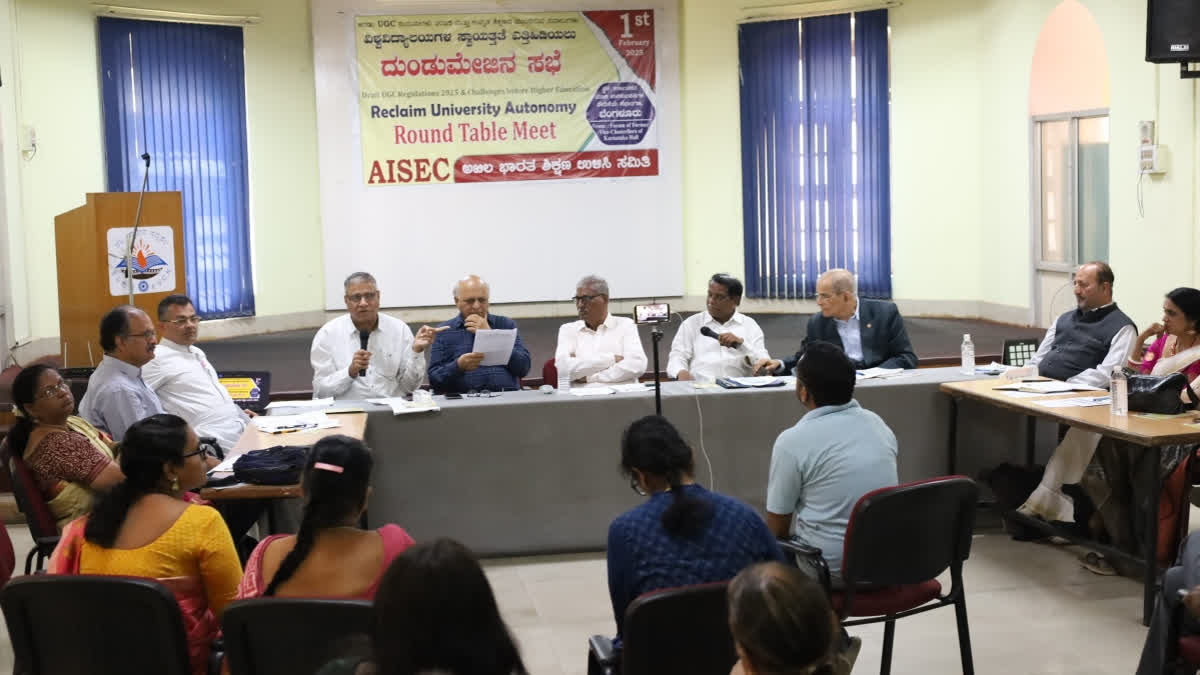Bengaluru: Several educationists and former Vice Chancellors (VCs) strongly opposed the draft UGC regulations saying they undermine the autonomy of states over higher education while encouraging the Centre's domination.
They participated in a roundtable discussion organised by the All India Save Education Committee (AISEC) here on Saturday. Prof A H Rajasab, former VC of Tumkur University, warned that the new regulations could severely impact access to education for marginalised groups, women, rural communities, and persons with disabilities. He accused the Centre of attempting to dominate the education sector, cautioning that appointments of VCs under these regulations could lead to influential families monopolising governance.
"Education will fall into the hands of industrialists who have no real understanding of the field," he stated, adding that the draft lacks social justice and constitutional values.
He further pointed out that states like Karnataka, West Bengal, and Tamil Nadu — which have not implemented the National Education Policy (NEP)—are being pressured to comply with the Centre's directives. He criticised the lack of democratic consultation in drafting the regulations, asserting that policies should be formulated only after discussions with students, lecturers, and other stakeholders.
AISEC State President Allamaprabhu Bettaduru criticised the UGC for failing to address the financial struggles of guest lecturers. "There is no clarity regarding the recruitment of lecturers, and guest faculty are suffering without salaries. Instead of engaging in meaningful discussions, the UGC is imposing its policies on states," he remarked.
VCs and academics at the meeting expressed deep concern over the erosion of university autonomy. AISEC State Vice President V N Rajshekhar argued that the centralisation of academic and administrative powers would stifle research, innovation, and free thinking. He emphasised that universities should retain decision-making powers, with VCs appointed through mutual agreement between universities and the government.
Prof Victor Lobo, VC of St. Joseph’s University, stated that the UGC appears to be acting above the Constitution and legislative assemblies, undermining the federal structure. He condemned the increasing encroachment of the Centre into education, warning that such moves disregard public representation in policymaking.
Writer and professor M S Ashadevi called the draft regulations the "final nail in the coffin" for higher education. She highlighted the lack of clarity regarding the promotion of Kannada and regional languages, raising concerns over their diminishing status.
Professor L.G. Mira further emphasised that the draft provides no solutions for guest faculty, pushing them into greater job insecurity.
Scientist R.L. Mauryan accused the UGC of drafting policies with political motives rather than academic interests. He urged the Centre to stop imposing ideological control over education and instead adopt a democratic, consultative approach. Chairing the session, Prof A Murigeppa, former VC of Hampi Kannada University, urged society to actively discuss and oppose these harmful policies.
At the conclusion of the meeting, it was resolved that a formal representation highlighting these concerns would be submitted to both the state and central governments. The roundtable saw participation from prominent academics including Dr. S. Chandrashekar Shetty, Professor T.D. Kemparaj, Rajesh Bhatt, Gopal Krishnan, and retired professors K.V. Bhatt, Professor Nagaraja Reddy, Sunitha S., and others.



